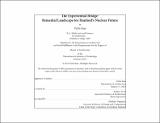The Experiential Bridge: remedial landscape for Hanford's nuclear future
Author(s)
Kim, Yuna
DownloadFull printable version (18.15Mb)
Alternative title
Remedial landscape for Hanford's nuclear future
Other Contributors
Massachusetts Institute of Technology. Department of Architecture.
Advisor
Andrew Scott.
Terms of use
Metadata
Show full item recordAbstract
The groundbreaking discovery of nuclear fission opened up new possibilities for generating power and resources for people. Nuclear energy was much preferred over fossil fuel because of its efficiency in production, availability of resources, and cost. However, the reoccurring nuclear disasters around the world provoke us to reconsider the future of nuclear energy. This thesis acknowledges the contemporary issues particularly surrounding nuclear waste contamination and the risks that associated toxins present to human health and the existing ecosystem. The risk of exposure to radioactive materials and groundwater contamination can be reduced with proven technological methods but the public perception of nuclear waste treatment remains a daunting deterrent, preventing people from confronting the waste management issues effectively. The thesis investigates ways to create new typology of remedial infrastructure where nuclear waste management technologies can co-exist with cultural programs; the new typology becomes an instrument that helps people to rethink the future of nuclear energy. The Experiential Bridge enables greater adoption of environmentally friendly nuclear waste treatment by exposing the process to the public and creating an educational experience for people. The Experiential Bridge not only treats toxins, but also serves as a pathway for recreational activity, and a source of education for the treatment of contaminated water and soil.
Description
Thesis (M. Arch.)--Massachusetts Institute of Technology, Dept. of Architecture, 2013. This electronic version was submitted by the student author. The certified thesis is available in the Institute Archives and Special Collections. Cataloged from student-submitted PDF version of thesis. Includes bibliographical references (p. 101-103).
Date issued
2013Department
Massachusetts Institute of Technology. Department of ArchitecturePublisher
Massachusetts Institute of Technology
Keywords
Architecture.